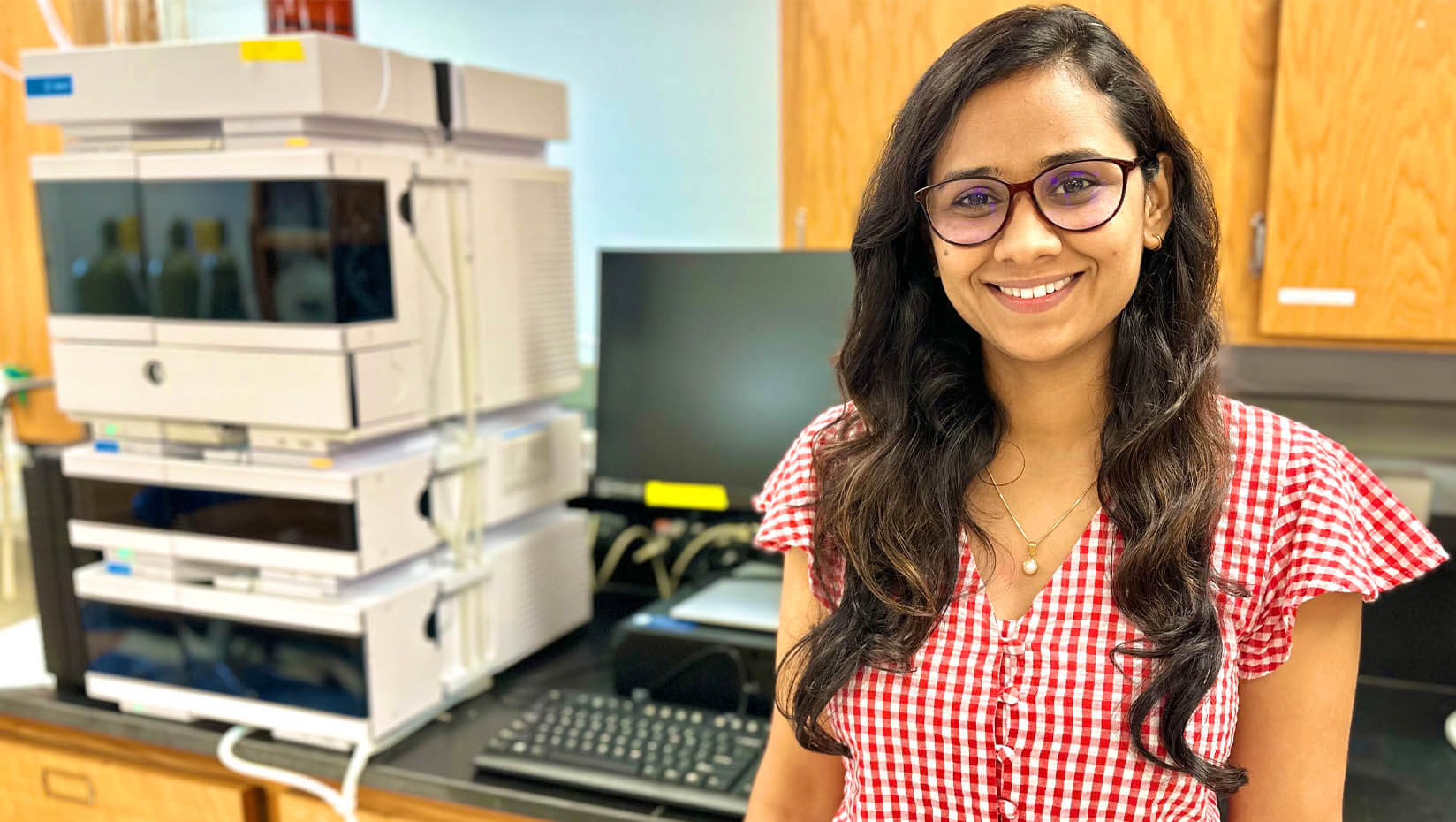
L.L.Bean supporting UMaine’s work on eradicating ‘forever chemicals’
Editor’s note: This story was updated Sept. 21.
University of Maine postdoctoral scholar Manisha Choudhary is researching ways to eradicate toxic so-called “forever chemicals” known as per- and polyfluoroalkyl substances, or PFAS, and training other students thanks to support from L.L.Bean.
The outdoor goods retailer based in Freeport, Maine gifted a two-year, $150,000 grant for Choudhary’s work as the L.L.Bean Postdoctoral Scholar. The gift is part of the recently launched L.L.Bean PFAS Solutions Research Program at UMaine and coincides with the company’s commitment to remove PFAS from all L.L.Bean labeled products by the end of 2024.
PFAS have been used widely in industrial and consumer products such as nonstick pans, takeout food containers and firefighting foam since the 1940s for their resistance to grease, oil, water and heat. Current research suggests that exposure to high levels of certain PFAS may lead to adverse health outcomes, including immune system disorders, thyroid hormone disruption and cancer. PFAS are referred to as “forever chemicals” because they tend to break down very slowly or not at all. They can bioaccumulate in plants, animals and people.
Choudhary is investigating how to use nanotechnology to remove and destroy PFAS from water supply systems, alongside Onur Apul, assistant professor of civil and environmental engineering. Her project specifically involves developing graphene nanosheets that can adsorb PFAS from water, then destroying these toxic chemicals by processing them at high temperatures. Through this process, known as thermal regeneration, she hopes the nanosheets could be reused to adsorb more PFAS. For her project, Choudhary will work in Apul’s lab and the Frontier Institute for Research in Sensor Technologies (FIRST).
In addition to conducting research, Choudhary is working with Apul to mentor Ph.D. student Sonia Moavenzadeh, who is investigating how to remove PFAS from biosolids in soil and water. When the fall semester starts, she also will oversee a team of undergraduate researchers in Apul’s lab who also are working on thermal generation research.
“Manisha’’s work encompasses a multifaceted approach that addresses the urgent needs of the people of Maine” Apul says. “It will not only advance water treatment for PFAS mitigation but also her role in outreach and education will raise awareness about the risks posed by PFAS and the importance of proactive measures to tackle the issue.”
Before coming to UMaine in November 2022, Choudhary, of Jhunjhunu, Rajasthan, India, worked as a postdoctoral researcher at Temple University. She earned her master’s degree and Ph.D. from the Indian Institute of Technology in Kharagpur, India.
Choudary’s other research interests involve the degradation of micropollutants, pharmaceutical and personal care products (PPCPs), pesticides, other emerging contaminants and endocrine disrupting compounds in water and wastewater treatment processes using advanced treatment technology like non-thermal plasma.
At UMaine, Choudhary collaborated with other environmental engineering and Intermedia MFA students on an art exhibit, “Co-Translation: Making the Invisible Visible — Nanotechnology and Art vs PFAS and Microplastics” displayed during Maine Impact Week in April at the Innovative Media Research and Commercialization (IMRC) Center.
“Working at UMaine with Dr. Apul to combat the PFAS public health crisis is more than just a job; it’s a passion-driven mission to protect our communities and the environment. It is both humbling and empowering to be part of a dedicated team, driven by a shared commitment to make a meaningful difference in the lives of countless individuals and future generations,” Choudhary says. “I extend my heartfelt gratitude to L.L.Bean for their visionary initiative in taking a proactive stance to mitigate the PFAS issue. Their unwavering support and sponsorship for my postdoctoral research at UMaine will undoubtedly accelerate our collective efforts in finding a sustainable solution to this critical public health crisis.”
Many UMaine faculty members are working together on a variety of PFAS research projects and outreach efforts as part of the PFAS+ Initiative. Apul is science lead and a steering committee member for the initiative, which focuses on the emerging PFAS pollution crisis and its cascading environmental and societal impacts.
Other researchers involved in PFAS-related work are based out of the Maine College of Engineering and Computing; College of Natural Sciences, Forestry and, Agriculture (NSFA); College of Liberal Arts and Sciences; University of Maine Cooperative Extension; the Office of Strategic Partnerships, Innovation, Resources and Engagement (SPIRE); and the Senator George J. Mitchell Center for Sustainability Solutions.
The L.L.Bean Postdoctoral Scholar grant was made possible through collaboration between the retailer and the UMaine Portland Gateway, created to connect research, education and outreach expertise to southern Maine.
“As a stakeholder company whose purpose is to enable the enjoyment of the outdoors, we naturally count the environment as one of our stakeholders,” says Shawn Gorman, executive chairman of L.L.Bean. “We recognize PFAS is an urgent threat to our environment that requires collective action, which this endowment initiates thanks to UMaine’s leadership. This is also why we have committed to removing PFAS from all L.L.Bean labeled products by the end of 2024.”
Over the years, L.L.Bean has contributed to several initiatives at UMaine and across the University of Maine System. It has donated to the Outdoor Leadership Program at UMaine, sponsored research at the Advanced Manufacturing Center, provided internship and paid guide apprenticeship opportunities, and brought its pop-up store to Family and Friends weekend on campus.
In 2022, the company provided a $300,000 gift to support efforts between the University of Maine Graduate and Professional Center and other partners in bolstering the outdoor recreation economy. That same year, it also provided $850,000 to the University of Southern Maine Foundation, including $750,000 for a new Career and Student Success Center (CSSC) and green campus, and $100,000 for the L.L.Bean Environmental Science Endowed Scholarship for USM students.
Contact: Marcus Wolf, 207.581.3721; marcus.wolf@maine.edu
